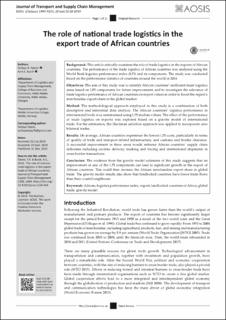| dc.contributor.author | Takele, Tesfaye B | |
| dc.contributor.author | Buvik, Arnt | |
| dc.date.accessioned | 2023-10-10T11:15:04Z | |
| dc.date.available | 2023-10-10T11:15:04Z | |
| dc.date.created | 2020-03-01T11:27:32Z | |
| dc.date.issued | 2019 | |
| dc.identifier.citation | Journal of Transport and Supply Chain Management. 2019, 13, 147-157. | en_US |
| dc.identifier.issn | 2310-8789 | |
| dc.identifier.uri | https://hdl.handle.net/11250/3095473 | |
| dc.description.abstract | Background: This article critically examines the role of trade logistics in the exports of African countries. The performance of the trade logistics of African countries was analysed using the World Bank logistics performance index (LPI) and its components. The study was conducted based on the performance statistics of countries around the world in 2016. Objectives: The aim of this study was to identify African countries’ inefficient trade logistics areas based on LPI components for future improvement; and to investigate the relevance of trade logistics performance of African countries on export values in order to boost the region’s merchandise export share in the global market. Method: The methodological approach employed in this study is a combination of both descriptive and inferential data analysis. The African countries’ logistics performance in international trade was summarised using LPI median values. The effect of the performance of trade logistics on exports was explored based on a gravity model of international trade. For the estimation, the Heckman selection approach was applied to incorporate zero bilateral trades. Results: On average, African countries experience the lowest LPI score, particularly in terms of quality of trade and transport-related infrastructure, and customs and border clearance. A successful improvement in these areas would enhance African countries’ supply chain deliveries including on-time delivery, tracking and tracing and international shipments in cross-border transactions. Conclusion: The evidence from the gravity model estimates of this study suggests that an improvement in any of the LPI components can lead to significant growth in the export of African countries. This could then increase the African merchandise export share in global trade. The gravity model results also show that landlocked countries have lower trade flows than their coastal neighbours. Keywords: African, logistics performance index, export, landlocked countries of Africa, global trade, gravity model | en_US |
| dc.language.iso | eng | en_US |
| dc.relation.uri | https://doi.org/10.4102/jtscm.v13i0.464 | |
| dc.rights | Navngivelse 4.0 Internasjonal | * |
| dc.rights.uri | http://creativecommons.org/licenses/by/4.0/deed.no | * |
| dc.title | The role of national trade logistics in the export trade of African countries | en_US |
| dc.type | Peer reviewed | en_US |
| dc.type | Journal article | en_US |
| dc.description.version | publishedVersion | en_US |
| dc.source.pagenumber | 147-157 | en_US |
| dc.source.volume | 13 | en_US |
| dc.source.journal | Journal of Transport and Supply Chain Management | en_US |
| dc.identifier.doi | 10.4102/jtscm.v13i0.464 | |
| dc.identifier.cristin | 1798702 | |
| cristin.ispublished | true | |
| cristin.fulltext | original | |
| cristin.qualitycode | 1 | |

